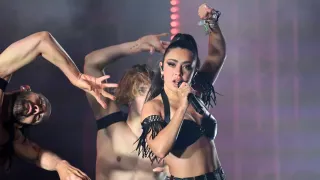
2 hours ago
Lukas Gage Opens Up About Trauma, Abuse, and Being Gay In Hollywood
READ TIME: 3 MIN.
Lukas Gage, known for his roles in acclaimed series such as “The White Lotus” and “Euphoria,” has long been recognized for his on-screen charisma and advocacy for LGBTQ+ visibility. In a deeply personal interview with The Guardian, published on October 6, 2025, Gage discussed the profound impact of sexual abuse and abandonment during his formative years, marking a rare moment of candor for the young star .
Gage revealed that his early life was shaped by significant trauma, including experiences of sexual abuse and abandonment by family members. He described the emotional weight of these incidents and the lasting effects they have had on his sense of self-worth and interpersonal relationships. The actor’s willingness to confront these issues publicly is notable in an industry that often pressures LGBTQ+ individuals to maintain carefully curated public personas .
In the interview, Gage spoke about how these experiences shaped his approach to acting: “Everything I do comes from a place of searching for love and stability. When you grow up without it, you never stop looking” . His words resonate deeply with many LGBTQ+ people, for whom rejection and familial estrangement remain all too common .
Gage’s interview comes at a time when conversations about representation and authenticity in the entertainment industry are evolving. He discussed the pressures queer actors face to conform to expectations—whether that means remaining closeted or fulfilling stereotypical roles. Gage reflected on how being open about his identity and past trauma is both liberating and fraught with challenges in a business where vulnerability can be a double-edged sword .
He also spoke about the tension between personal healing and public perception, noting, “There’s a lot of fear about being typecast or not being given the same opportunities as straight actors. But I believe being honest about who I am makes me a better artist and a better advocate” .
Throughout the interview, Gage emphasized the importance of storytelling as a form of healing—not just for himself, but for others who may feel isolated by their experiences. “Telling my story is about taking back my power. If even one person feels seen or less alone because of it, then it’s worth it,” he said .
His openness has sparked important conversations about trauma, mental health, and the unique barriers faced by LGBTQ+ people in creative fields. LGBTQ+ advocacy groups have long highlighted the need for increased support and visibility, noting that public figures like Gage play a crucial role in reducing stigma and fostering acceptance .
The response to Gage’s revelations has been overwhelmingly supportive, with many fans and fellow actors expressing admiration for his courage. On social media, LGBTQ+ advocates and community members have underscored the importance of high-profile individuals speaking openly about difficult subjects, particularly those that remain taboo or misunderstood .
Industry leaders have also weighed in, calling for more comprehensive mental health resources for actors and greater accountability in addressing abuse within the entertainment sector. The discussion aligns with broader calls for systemic change, including more nuanced portrayals of queer lives and experiences onscreen .
Gage’s story is far from over. He indicated that sharing his truth is an ongoing process, one that requires continual self-reflection and support from chosen family and community. As the entertainment industry grapples with issues of representation and responsibility, voices like Gage’s serve as reminders of the work still to be done—and the transformative power of honesty .
For many LGBTQ+ individuals, Gage’s interview stands as a testament to resilience and the enduring need for spaces where all stories can be told without fear or shame.






